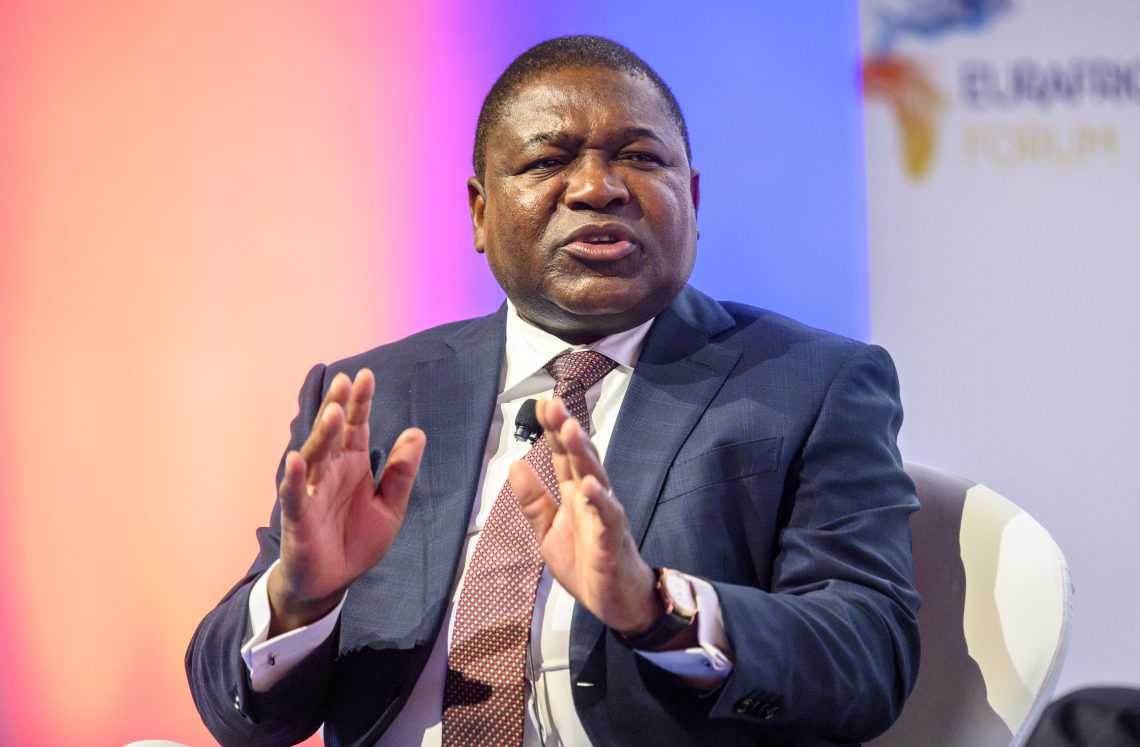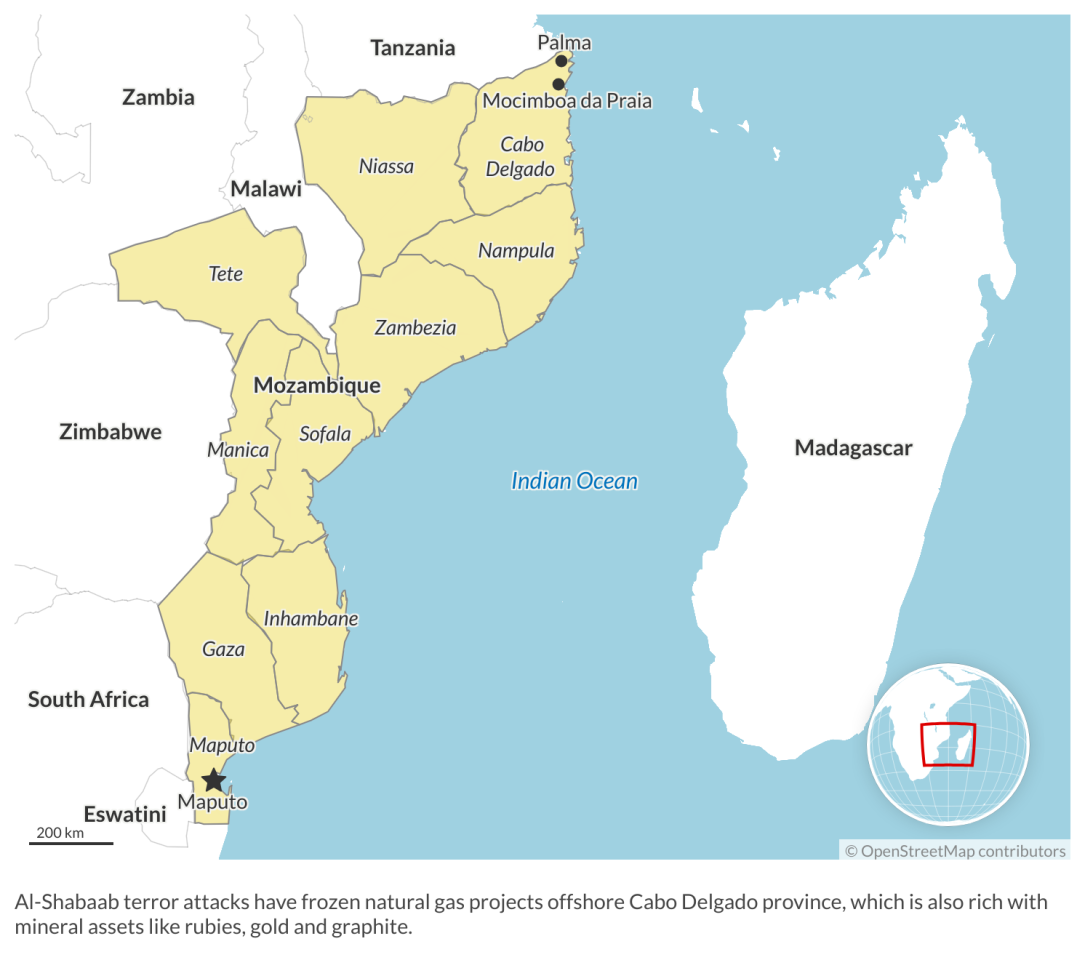How terrorism threatens the future of Mozambique
Mozambique can only capitalize on its offshore energy potential if it maintains political stability and reduces the threat of terrorism.

In a nutshell
- Terror attacks have brought economic disaster to Mozambique
- Military intervention by Rwanda has helped Maputo stem the threat
- Instability after recent elections could also threaten energy prospects
At the end of July, during a state visit by his Cuban counterpart, Mozambican President Filipe Nyusi announced the death of the terrorist leader Bonomade Machude Omar, also known as Ibn Omar or Abu Suraka. The news came after a military communique by Joaquim Mangrasse, chief of general staff of the country’s army. Yet Mr. Nyusi was cautious, warning his audience that the war was not over.
Ibn Omar was the second-in-command of Al-Shabaab, a jihadist guerilla force and local affiliate of the Islamic State (one distinct from the Somali militant group of the same name). Since October 2017, the group has terrorized the northern region of Mozambique, killing more than 6,500 people and displacing hundreds of thousands more.
In addition to the human consequences, with terror attacks making regular life impossible for the local population, they have caused a major economic disaster. Al-Shabaab has paralyzed the country’s administrative network, halting natural gas field projects offshore Cabo Delgado province for two large energy multinationals, TotalEnergies and ExxonMobil. Freezing these projects has also frozen the high expectations for the Mozambican economy.
Military intervention
During 2020 and 2021, the terrorists escalated their attacks on coastal towns, like Mocimboa da Praia and Palma. Foreign energy companies, faced with the risks of casualties among their staff, suspended their gas projects. When local military and police proved unable to beat the militants back, the Southern African Development Community (SADC) regional organization sent a force to support the Maputo government: the SADC Mission in Mozambique, or SAMIM.
Additionally, Rwandan President Paul Kagame, after conversations with French President Emmanuel Macron and Total CEO Patrick Pouyanne, sent a contingent of military and police personnel in July 2021. Later that year, Mr. Kagame himself visited Mozambique and reinforced the Rwandese forces operating in the critical areas, which numbered around 3,000. This effort seems to have found success.
Mozambique is not the only African country where Rwandan troops have been deployed; similar contingents have operated in the Central African Republic (CAR) and, successfully, within several United Nations missions, including in Sudan’s Darfur. Mr. Kagame had been effective in restoring stability and a strong state in his own country, following the terrible genocide of 1994. And his notion of helping other African states reduce terrorism and instability – with a spirit of “African solutions for African problems” – has been a hit. To do so, he transformed the Rwanda Defense Force (RDF) from a resistance force against genocide into an effective peacekeeping army.
In the CAR, some 2,000 Rwandans initially formed a UN stabilization mission, MINUSCA. But at the end of 2020, President Faustin-Archange Touadera negotiated an agreement with Mr. Kagame for the RDF to help the CAR resist armed Islamist groups. RDF troops, with the support of Russia’s Wagner Private Military Company, managed to make progress against the insurrection. It was after this success that Mozambique’s Nyusi – facing attacks from Al-Shabaab militants who had occupied the city of Palma in the heart of the gas fields’ region – asked for help. Until then, the Mozambique Defense Armed Forces (FADM), alongside private mercenary companies like Wagner and South Africa’s Dyck Advisory Group, had been unsuccessful in the struggle against the jihadist rebels.
Concerning the Wagner group, some sources cite an initial arrival in Cabo Delgado, in the autumn of 2019, of 200 mercenaries equipped with drones and helicopters, including a Hind gunship. Their mission was to beat back Al-Shabaab and train the local military, and they were reportedly to be paid with concessions in areas where natural gas could be produced. But the operation was a failure; ties with the Mozambican military were poor and the group soon suffered heavy casualties. It seemed they were not prepared to fight in the dense jungle of northern Mozambique. After three months, they withdrew.
Rwanda is a small, landlocked and heavily populated (13.5 million) country with practically no natural resources. The country went through a horrific experience of genocide in the 1990s. The leadership in Kigali, under President Kagame, saw the outsourcing of the RDF to other African countries as both an economic boon and a way to elevate Rwanda’s profile. Despite his authoritarian profile (or perhaps because of it), Mr. Kagame is considered one of the most effective leaders on the continent.
His “military diplomacy” has been an important tool for increasing both his own prestige and the country’s, with African security insiders suggesting the “Rwandan approach” could even be a solution for the Sahel’s security problem. The relative success of the RDF in Mozambique, in contrast to the current failures of major multilateral UN operations, has supported this proposition. But doubts about the limits of these interventions continue to fuel criticism.
Gas projects
The province of Cabo Delgado has many natural resources – not just offshore gas fields but also mineral assets like rubies, gold and graphite. The key question now is whether big energy companies like Total and Exxon will reestablish their operations there. Do they already feel comfortable with the new security situation, following the latest news of the death of the terrorist commanders?
Total stopped its project in the region in April 2021, declaring force majeure. On July 6, 2023, following an announcement by President Nyusi over increased security measures, Le Monde quoted a cautious statement from Total sources about a possible resumption of works. As for Exxon, it could return to the project and give its final approval in 2025, which will “depend on the security situation,” according to the company’s senior vice president for upstream oil and gas. This will be decisive for the future of Mozambique, whose hopes in natural gas projects have been held hostage for more than a decade by continued instability.
Corruption
Another nagging concern has been the so-called “ghost loan” or “hidden debt” scandal. Ten years ago, with the complicity of the government and top security officials, three local public companies borrowed $2 billion from international banks. After the scandal was made public in 2016, the issue returned to the headlines in July 2023 – when former Finance Finister Manuel Chang, who was in office at the time of the deal, was extradited to the United States after four years of detention in South Africa. Mr. Chang was charged with serious corruption practices related to a scandal during the mandate of President Nyusi’s predecessor, Armando Guebuza.
In New York, Mr. Chang was brought before a federal district judge who denied the suspect’s request for bail, citing a high risk of flight, which underlined the plausibility of the case. The main charges against Mr. Chang are related to his role as finance minister in guaranteeing the infamous ghost loans or “tuna bonds,” which cost the Mozambican treasury more than $2 billion. According to American prosecutors, more than $200 million was spent as bribes to high-ranking government officials, including ministers, security officials and then-President Guebuza’s own son, Ndambi Guebuza. The country’s image was seriously damaged by the affair, and both the International Monetary Fund and the G20 suspended support programs.
The vicious cycle of terrorist violence and economic inefficiency is difficult to break.
The welcome news of success in the fight against terrorism and the renewed spotlight on corruption have both come during a tense political moment in Mozambique. Municipal elections were held on October 11. Given the longstanding accusations of fraud against the ruling party FRELIMO (Liberation Front of Mozambique), in power since independence, the main opposition party RENAMO (National Resistance of Mozambique) had warned that they would not accept irregularities and abuses.
In an election speech in Nampula, an important city in the center-north, RENAMO leader Ossufo Momade emphasized the need for “free, fair and transparent elections” and expressed certainty that his party’s candidate would win locally. At the same time, in a bid to sway the government’s security forces, he threatened that RENAMO could return to armed rebellion if FRELIMO employed fraud to stay in power.
Chorus of protest
As feared, however, the municipal elections gave rise to massive fraud in favor of FRELIMO candidates. Before the count, the opposition parties – RENAMO and MDM (Mozambique Democratic Movement) – were expected to win numerous races in the north and central regions, and in the capital Maputo. It was a shock when, after the election results were announced (with some delay), the opposition notched only one victory in the second city of Beira.
Mr. Momade led significant street protests, accusing the government of perpetrating a massive electoral fraud. This was less significant than the response of the courts, which generally do not act independently but this time confirmed that fake copies of polling station results were used to change the outcome.
Furthermore, Catholic bishops in the country joined the opposition protests, charging the government with widespread fraud and misconduct. The same was done by the U.S. embassy in Maputo, validating the strength of the opposition protests. Missing results sheets and eyewitness accounts of ballot stuffing have been reported, and in some districts, the courts have ordered ballots to be recast.
Read more on Sub-Saharan Africa
The Wagner Group’s future in Africa
Another player has come to the spotlight, an important and unexpected one: Samora (“Samito”) Machel Junior, the son of former President Samora Machel, a FRELIMO leader and first head of state of Mozambique.
Referring to electoral fraud and repression by police – like the shooting of citizens protesting against “flagrant violations of the integrity of the choices made by the voters” in the elections – “Samito” did not hesitate to invoke his status as “a member of the FRELIMO Party and of the Central Committee.” In a message, the son of one of the party’s founding fathers sharply criticized the police violence that killed several protesters.
In an important and unprecedented development, a highly symbolic figure of the ruling party, along with the U.S. embassy and the Catholic bishops, formed a chorus of dissent with the opposition and citizens on the streets. Adding to the protests, the vice president of the Technical Secretariat for Electoral Administration contested the body’s decision to recognize the validity of the vote. Opposition parties have called for mass demonstrations throughout the country.
Scenarios
In Mozambique, as elsewhere in sub-Saharan Africa, political stability and economic progress are closely linked. For almost a decade, the liquefied natural gas projects offshore Cabo Delgado have been the great hope for a big leap forward in the country’s development. But this prospect is totally dependent on political order and security, as the major energy companies are not willing to risk the lives of their employees.
Terrorism is brought under control
If terrorism is brought under control or reduced to a marginal activity, allowing Total, Exxon and their partners in oil and gas projects to return and resume operations; if the “tuna loans” case is closed with the sentences of the current defendants in Maputo trials; and if suspicions of municipal elections fraud are resolved without major violence, better prospects can finally be seen.
To seriously fight terrorism, leaders must have the military capacity for on-the-ground operations and the governing capacities to regain the trust and support of the population. The few historical successes in these kinds of cases – such as European governments fighting colonial insurrections like the French in Algeria, the Portuguese in Angola and the British in Kenya and Malaya – confirm this view. Until now, the government in Maputo has not demonstrated these capacities, and there are serious doubts it will be able to find them.
Terrorism continues
If, however, terrorist activities continue, forcing energy companies to keep waiting and putting the country’s economy on standby; if municipal elections are seen as corrupted; and if the New York trials incriminate even more political and economic players from Mozambique’s government and political elite, everything will be postponed, and the country’s future will continue to deteriorate.
The vicious cycle of terrorist violence and economic inefficiency is difficult to break. Mozambique cannot improve its economy, which depends on energy mining and agriculture, without peace on the ground; and to restore peace, it needs to employ force and to have citizens that are happy with the economy. Violence until now has been restricted to the north of Mozambique, and there is no reason for it to expand south or across external borders, given the role of local tribal factors that are less relevant elsewhere. The problem is that the key resources for an economic change are precisely in the threatened region, off the coast of Cabo Delgado.
With the ongoing post-election protests adding to the threat of jihadist terrorism, economic paralysis and divisions inside the ruling party, Mozambique’s prospects look very dim without significant changes.
For industry-specific scenarios and bespoke geopolitical intelligence, contact us and we will provide you with more information about our advisory services.






